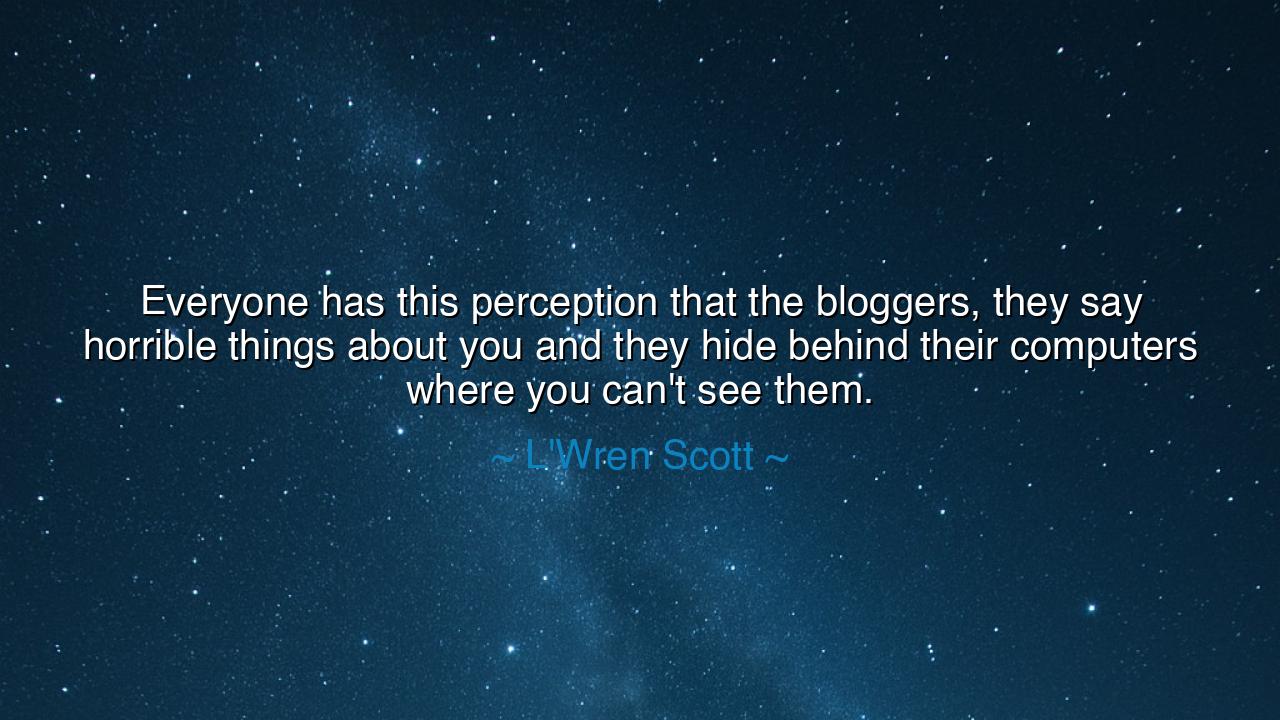
Everyone has this perception that the bloggers, they say horrible
Everyone has this perception that the bloggers, they say horrible things about you and they hide behind their computers where you can't see them.






In the ever-changing landscape of human connection and communication, the voice of criticism has found new avenues. L'Wren Scott, the renowned fashion designer, once observed, “Everyone has this perception that the bloggers, they say horrible things about you and they hide behind their computers where you can't see them.” These words speak to a truth that cuts deep into the heart of the modern age—a truth about the power of anonymity, courage, and the complexity of human expression. Scott’s observation is not just about bloggers or critics, but about the nature of communication itself in a world where the physical barriers of distance and presence no longer serve as limits to speech.
In the ancient world, the words of a person held great weight—to speak was to stand before the people, to bear the consequences of one's words in full view. Socrates, that great philosopher, would stand in the agora, his thoughts put forth for all to hear, and his words were answered not with silence, but with debate, with opposition, and sometimes even with death. His fate was sealed not by the unseen voices of anonymous critics but by the open, visible conflict of ideas. It was in the physical world, in the public square, where his ideas were tested, refined, and, ultimately, judged. In this ancient time, to speak was to take responsibility for one’s voice, to own the weight of one's words.
However, in the modern world, anonymity has allowed the opposite to occur. The rise of digital communication has created a space where anyone, anywhere, can voice their opinions, criticisms, and judgments without the need for physical presence. The blogger, the anonymous critic, no longer needs to face their target, to engage with the individual they criticize. Instead, they can speak freely, often without facing the consequences that would arise from a face-to-face encounter. This lack of accountability creates an environment where the lines between honesty and hatred become blurred, and where constructive criticism is often drowned out by the roar of negativity.
The story of Diogenes, the ancient philosopher known for his sharp criticism of society, provides an interesting comparison. Diogenes was known to speak his mind boldly and without fear, often in public spaces, unashamed of his unconventional ideas. He would criticize the social norms of Athens, but he did so with a sense of humility and courage, standing before those he challenged. If he were alive today, Diogenes would likely have engaged with critics, not in the shadow of anonymity, but face-to-face, in dialogue and direct confrontation. This direct engagement lent his critiques a power and clarity that the faceless, digital criticism of today can often lack.
L'Wren Scott’s words, then, are a call to recognize the dangers of anonymity and the impersonal nature of modern communication. While technology has brought the world closer together, it has also created a space where criticism can be wielded with little regard for the humanity of the target. The bloggers Scott refers to are not just faceless voices; they are individuals who may hide behind their screens, using their anonymity to say things they might never say in person. The hurt caused by such words, delivered without the context of personal connection, is often deeper because there is no consequence for the words spoken.
The lesson to be learned here is one of responsibility—the responsibility we all bear when we use our voices, whether they are spoken or typed. As Socrates showed us, true wisdom comes from the ability to speak and listen in open dialogue, to engage with others face-to-face and understand the impact of our words. In this modern age, we must not forget that every voice carries power, and with that power comes the obligation to be accountable for what we say. Words are powerful, yes, but they must be used with care, for they can wound just as easily as they can heal.
As we navigate the world of digital communication, the practical action is clear: we must seek to engage more authentically. When we feel the urge to criticize or speak negatively, let us remember that the absence of physical presence does not absolve us of the responsibility to speak kindly or constructively. If we must criticize, let it come from a place of understanding, not from the shadows of anonymity. Let us strive for a world where our words are as accountable as our actions, and where the dialogue between us is rooted in respect and human connection.
In the end, L'Wren Scott's words challenge us to reflect on the nature of communication in our time. Anonymity may protect us, but it also distances us from the very essence of connection—the shared, vulnerable experience of speaking directly to another person. To speak is to take ownership of one's words, to engage fully with the world and with those we communicate with. Let us choose to speak, not from behind the safety of a screen, but from the heart of human experience, where honesty, empathy, and respect are the true foundations of dialogue.






AAdministratorAdministrator
Welcome, honored guests. Please leave a comment, we will respond soon